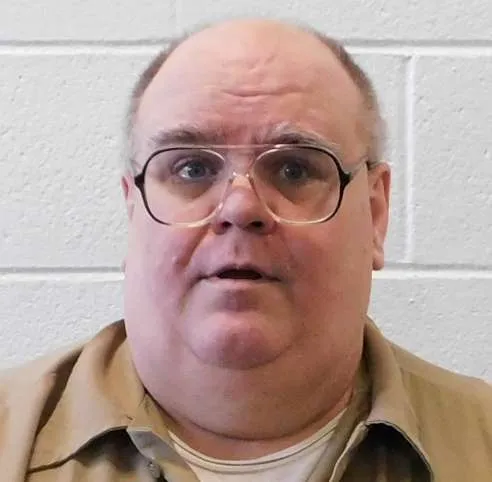Alabama man declared 'mentally ill' faces execution by method witnesses called 'horrific'
A man convicted of killing his coworkers over rumors about his sexuality is about to become the second man in Alabama to be executed with nitrogen gas, a method that one witness described as "horrific."
Alan Eugene Miller, 59, is set to be executed Thursday in the Aug. 5, 1999, murder of his current and former coworkers in two back-to-back attacks: Terry Jarvis, Lee Holdbrooks and Christopher Yancy.
The attacks happened at Post Airgas, a welding supply store, and Ferguson Enterprises, both in the suburban Birmingham city of Pelham. Miller killed the men because he believed Jarvis told Holdbrooks and Yancy that Miller was gay, according to court documents obtained by USA TODAY.
Despite a forensic psychiatrist testifying that Miller was "mentally ill at the time of the offenses," the court sentenced him to death..
If Miller's gassing moves forward he'll be the fourth inmate executed in Alabama in 2024 and the 18th in the nation. His execution comes on the same day as Oklahoma plans to execute Emmanuel Littlejohn despite a clemency board's recommendation that his life be spared over questions of his guilt.
Miller and Littlejohn are among five inmates the U.S. is executing in a six-day period between Sept. 20 and 26, including Marcellus Williams, who was executed by Missouri on Tuesday despite strong doubts about his guilt.
As Miller nears his execution day, USA TODAY is looking back at his life, how he ended up on death row, and what to expect from the nitrogen gas method.

What did Alan Eugene Miller do?
On the morning of Aug. 5, 1999, Johnny Cobb opened the front door at Ferguson Enterprises to the sound of loud noises, screaming and the sight of Miller walking toward him with a pistol, according to court documents. "I'm tired of people starting rumors on me," Miller told him.
Miller told Cobb to get out of his way, walked to his truck and drove away. Inside, 32-year-old Yancy and 28-year-old Holdbrooks were bleeding out from multiple gunshot wounds.
As Pelham police investigated the crime scene at Ferguson Enterprises, Miller was walking into his former workplace, Post Airgas, where coworkers Terry Jarvis and Andy Adderhold had just arrived, court records say.
Miller approached the sales counter and called out to Jarvis by saying: “Hey, I hear you've been spreading rumors about me,” court records say. Jarvis replied that he had not, and that's when Miller shot him several times as Adderhold took cover behind the counter, court records say.
After shooting Jarvis, Miller pointed the gun at Adderhold's face as he begged for his life, records say. Miller spared Adderhold's life and told him to “get out right now" as the 39-year-old Jarvis was dying, according to the records.
Alan Eugene Miller convicted of murder, sentenced to death
Pelham police arrested Miller after finding him driving in his truck the same day. Once Miller was handcuffed, officers say they found a Glock lying on the driver's seat and an empty ammunition magazine on the passenger seat.
A jury later found Miller guilty of shooting Holdbrooks six times, Jarvis five times and Yancy three.
During Miller's sentencing hearing a forensic psychiatrist named Charles Scott determined that Miller was "mentally ill" at the time of the murders, court documents say.
"In Dr. Scott's opinion, Miller suffered from a delusional disorder that substantially impaired his rational ability," according to the court document. "This delusional disorder − coupled with Miller's history as a loner − resulted in Miller's believing the people he worked with talked about him and that they had spread rumors about him. Miller believed that Terry Jarvis had told other employees at Post Airgas that Miller was a homosexual."
Despite declaring Miller mentally ill, Scott said his condition did not meet the level of mania necessary to establish an insanity defense under Alabama law.

Who was Alan Eugene Miller before the murders?
Born on Jan. 20, 1965, Miller grew up with an extensive history of mental illness in his family, tracing back at least four generations, according to a federal appeals document filed in January 2013. While Miller had a close family dynamic with his mother Barbara, brother Richard, and half-sister Cheryl Ellison, records say his father's drug use led to physical and psychological abuse.
At a young age, Miller's family was constantly moving, he experienced "severe poverty," and when his parents divorced, his mother and siblings spent years on welfare and food stamps, records say.
Miller's mother remarried his father for financial reasons but court records say he struggled to hold a job, frequently thinking people were plotting against him or finding reasons to get angry with coworkers, court records say.
Barbara Miller described the homes that her family lived in as “junky, rat-infested, roach-infested, just falling in," records say.
As a boy, Miller attended seven or eight different schools, sometimes even switching in the middle of the year. He had very few friends, and other children constantly made fun of Miller, calling him names because they could tell he was poor from his clothing, records say.
Before the murders, Miller had a "nonviolent nature" and a "good employment history," according to his attorney.

Alan Eugene Miller's execution represents a 'moral apocalypse'
Miller is scheduled to become the second death row inmate to be executed using nitrogen gas in Alabama. The first was in January with the execution of 58-year-old Kenneth Smith, who "appeared to convulse and shake vigorously for about four minutes" after the nitrogen gas began flowing, according to reporter Marty Roney, who witnessed the execution for the Montgomery Advertiser, part of the USA TODAY Network.
The Rev. Jeff Hood, a spiritual advisor who has witnessed more than a half dozen executions, was at Smith's and described it as being by far "the most violent."
"We're talking about minutes and minutes of thrashing and spitting," Hood told USA TODAY. "His head going up and down (and) back and forth. The (expletive) gurney that's bolted to the floor started shaking."
Miller, who survived a 2022 lethal injection attempt, weighs around 400 pounds and is what Hood called a "shell of a human being."
"You've a got a situation where you're going to strap a 400-pound man to a gurney, suffocate him to death and expect that to go well," the reverend said, adding that this type of execution brings society closer to a "moral apocalypse."

Attempt to prevent execution dismissed by federal judge
Miller's attorneys asked a federal judge for a preliminary injunction in March to stop the upcoming execution, arguing that it violates the inmate's right to be free from cruel and unusual punishment.
"Alabama is evidently unable to carry out a nitrogen hypoxia execution without cruelly super-adding pain and disgrace, and prolonging death," a federal complaint filed by Miller's attorneys says.
The attorneys also said Miller is obese, has asthmatic bronchitis, and receives a diabetic food tray where he's housed at Holman Correctional Facility, according to the complaint.
The judge dismissed the request.
Disclaimer: The copyright of this article belongs to the original author. Reposting this article is solely for the purpose of information dissemination and does not constitute any investment advice. If there is any infringement, please contact us immediately. We will make corrections or deletions as necessary. Thank you.






